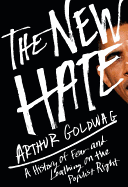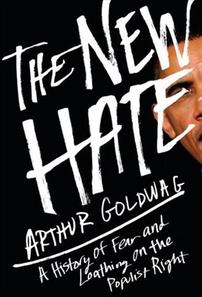
 For those unfamiliar with the history of right-wing extremism in the U.S., Arthur Goldwag's The New Hate provides a useful primer on the nation's "long-standing penchant for conspiratorial thinking, its never-ending quest for scapegoats." Goldwag's (Cults, Conspiracies, and Secret Societies) wide-ranging narrative hits most of the low points of American bias; one of the more intriguing chapters examines Henry Ford's virulent anti-Semitism and its roots in the notorious forged blueprint for Jewish world domination, The Protocols of the Elders of Zion. Though Donald Trump pumped hot air into his short-lived presidential balloon in 2011 by reviving discredited rumors about Barack Obama's citizenship, it's still startling to picture one of his business forebears publishing a newspaper as naked in its prejudice as Ford's Dearborn Independent.
For those unfamiliar with the history of right-wing extremism in the U.S., Arthur Goldwag's The New Hate provides a useful primer on the nation's "long-standing penchant for conspiratorial thinking, its never-ending quest for scapegoats." Goldwag's (Cults, Conspiracies, and Secret Societies) wide-ranging narrative hits most of the low points of American bias; one of the more intriguing chapters examines Henry Ford's virulent anti-Semitism and its roots in the notorious forged blueprint for Jewish world domination, The Protocols of the Elders of Zion. Though Donald Trump pumped hot air into his short-lived presidential balloon in 2011 by reviving discredited rumors about Barack Obama's citizenship, it's still startling to picture one of his business forebears publishing a newspaper as naked in its prejudice as Ford's Dearborn Independent.
Anti-Jewish prejudice (hardly limited to Ford, of course) is just one example of what Goldwag describes as a "toxic brew of racial, religious, gender, and nationalistic chauvinism" that has targeted Catholics, Freemasons and many others throughout American history. These bubbles of intolerance seem to reside permanently in our national bloodstream, often springing to life, like the onslaught of a new strain of virus, in periods of economic insecurity. Today, however, the more distasteful incarnations of such nativisim have been sanitized, making it possible for those willing to exploit them to earn a lucrative livelihood. Walk into any bookstore and you'll find an enthusiastic cadre of "right-wing performance artists and impresarios" like Glenn Beck, peddling books that gleefully conflate "liberal" with "demonic" or "fascist." (Goldwag reports that Beck garnered upward of $30 million in 2010, only a small fraction of which came from his now-canceled Fox News Channel show, where he resurrected deranged conspiracy theories, like the one about how the artwork at Rockefeller Center masks a communist agenda.)
Though his thoroughness in exploring this subject is impressive, Goldwag has one habit that detracts from the force of his narrative, especially in its latter stages: he's fond of quoting at length from the writings or speeches of his sometimes obscure subjects, and as their tirades take on a more extreme tinge, you may find yourself skimming to avoid spending too much time in their company. If there's any comfort in this dispiriting account, it's that the conspiracy-minded have (largely) been confined to the margins of American political and cultural life. That's small consolation, though, when balanced against the unavoidable conclusion that the haters will always be with us or, as Goldwag puts it, the realization that "the New Hate is the same as the Old Hate--only now it's hiding in plain sight." --Harvey Freedenberg
Shelf Talker: Arthur Goldwag presents a comprehensive, if at times depressing, history of right-wing extremism and its intermittent incursions into mainstream American political culture.

